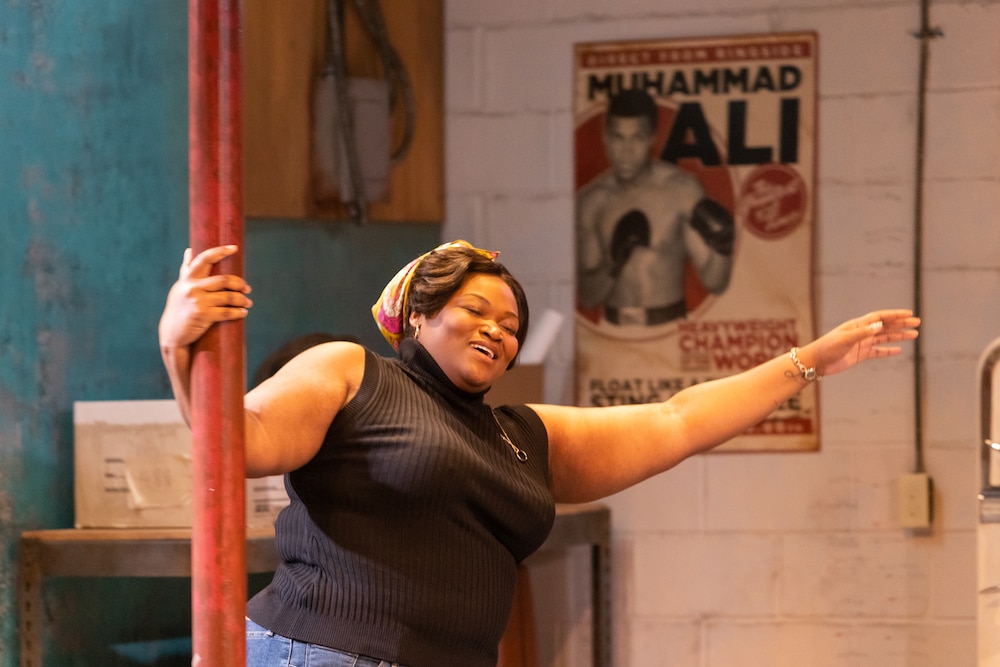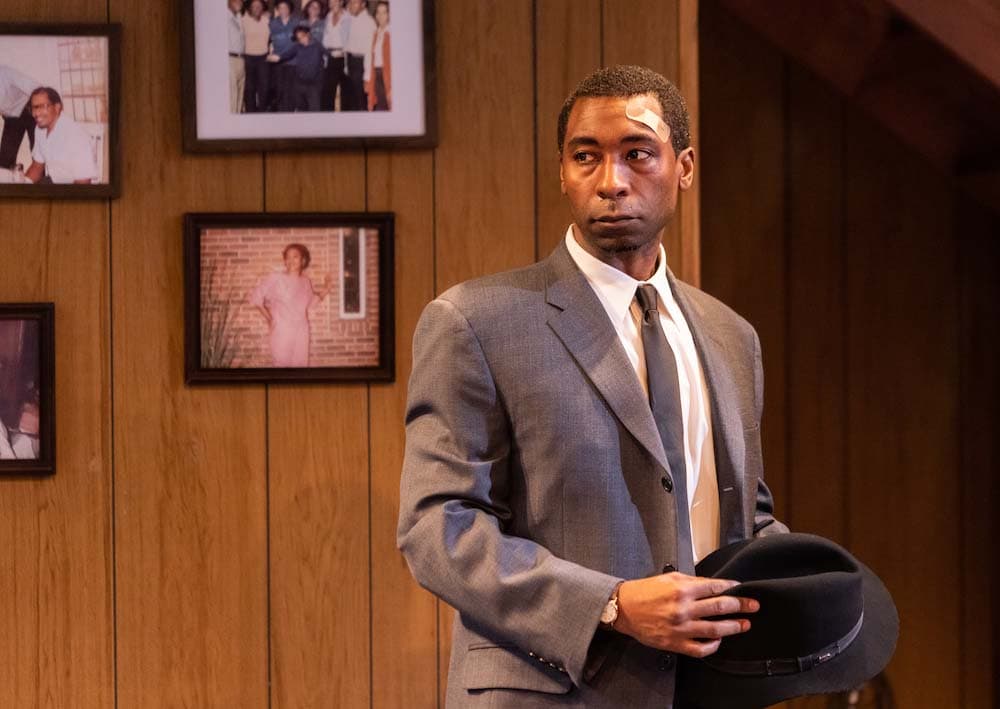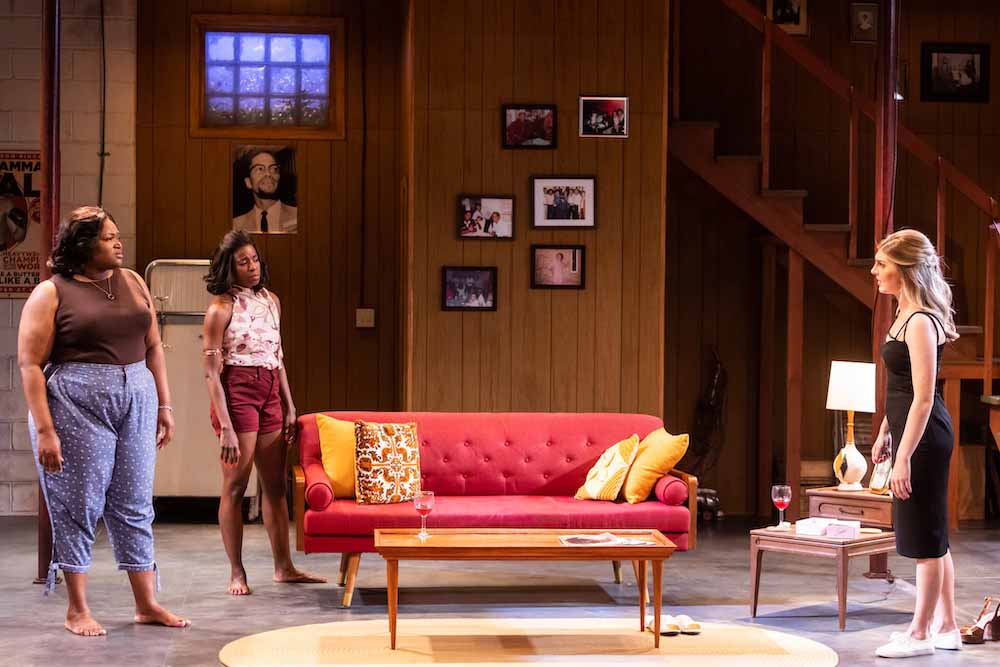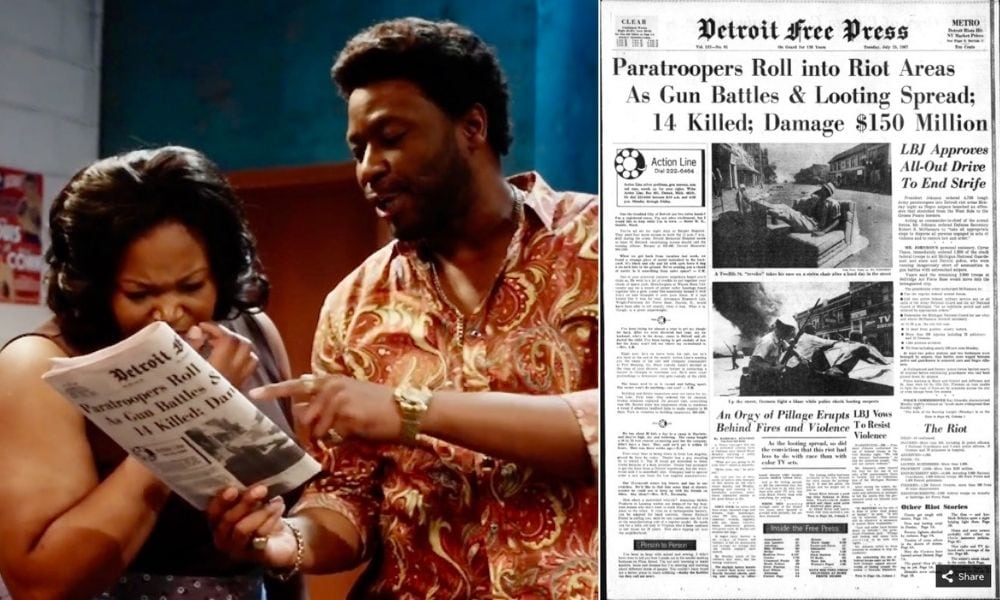Smack-dab in the middle of the Summer of Love, the Motor City exploded.
Detroit, beloved cradle of the Motown sound — marked by lustful lyrics, tight harmonies, and synchronized steps — was rocked by chaos early on July 23, 1967, after a vice squad raided an unlicensed club during an afterhours party for Black Vietnam vets. Five days of unrest followed, leaving 43 citizens dead, hundreds wounded, 7,000 detained, 1,400 buildings ransacked and razed, and racial discord deepened.
The so-called 12th Street Riot was among America’s bloodiest crises, turning Detroit into a war zone involving Army paratroopers and National Guardsmen. Considered a catalyst of the Black Power movement, protests continued to ripple nationwide.

Detroit ’67, by prize-winning playwright and Detroiter Dominique Morisseau, sews up Signature Theatre’s Signature Features virtual season with slice-of-life precision, focusing not on the city at large but on one household on the verge of splintering. It’s a history lesson presented by director Candis C. Jones with respect, nostalgic flair, and soul-ripping realism.
Siblings Chelle (Stori Ayers) and Lank Poindexter (JaBen Early) have inherited their parents’ home in Detroit’s Virginia Park neighborhood, on Clairmount, near 12th Street and the epicenter of the uprising. Along with the house comes a roughly $15,000 cash down payment on their dreams. They also run a clandestine afterhours joint and must transform the cellar digs into their new shindig space.

The entire play occurs in the basement, where Chelle dreamily spins records on her childhood phonograph. It alternately serves as a friends’ cozy hangout, a stranger’s haven, and a bunker from the horrors unfolding outside.
The talent is top-notch, a signature of Signature shows. Ayers is the production’s anchor, balancing coquettish charm with maternalistic wisdom and strength but never strident in tone. She’s the defender of her den, a proud single mom to a Tuskegee Institute college student, and she draws the line when brother Lank eyes a sketchy business opportunity. Early’s smooth-talkin’, dream-spinnin’ Lank oozes honey, even when sniping with his sis about upgrading her broken suitcase record player to the technology of the future, the 8-track! (Most of the characters spend undue time fumbling with the novel, simple contraption.)
Valeka Jessica is Chelle’s loyal confidante Bunny, a mover-and-shaker with enough sway to populate any party. Wig designer Anne Nesmith teases out Bunny’s character from chemically straightened vixen to busybody with a beehive. But Jessica adds a deeper dimension to those charged hips with supreme sparkle and optimism. The slick, captivating Greg Alverez Reid, Lank’s comic cohort, is fly as Sly, with his crowning processed “conk” and smoky eyes set on Chelle. Whiffs of his cologne almost permeate the screen.
Emily Kester impresses as pale outsider Caroline, dazed, hard-edged, and with halting speech that’s dead-on Michigander. No doubt a tribute to dialect coach Kim Bey, who also shaped the cast’s ’60s “jive” talk and elegant code-switching once the white girl intrudes.
“White flight,” often blamed as setting the stage for Detroit to become a powder keg, left a barren economy and 60,000 low-income people crammed into Virginia Park’s 460 acres. Yet in Detroit ’67, it’s a beat-up white girl fleeing something else who finds refuge in the Poindexter orbit and naturally takes a subservient role. The story turns the tables on the landmark film Guess Who’s Coming to Dinner, coincidentally released in 1967, which helped rewrite the narrative on interracial coupling.

One of the most powerful scenes in Detroit ’67 comes in a showdown between Caroline, who’s sweet on Lank, making a plea to Chelle about equality, arguing she and Lank are cut from the same cloth. Chelle’s smackdown: “You may dream the same. You may even feel the same heartbreak, but till he have the same title to this world you got, you and him ain’t gon’ never be the same.”
There’s nothing oppressive about the Poindexter’s underground lair, though themes of oppression are tastefully woven in. The bright, tidy space designed by Milagros Ponce de León is a nest of Easter egg clues supplying context for the place and times. A stenciled Black Power fist, representing Detroit boxing treasure Joe Louis, dominates. Posters of Muhammad Ali and Malcolm X adorn walls: after all, the Nation of Islam was founded in Detroit, and Champ Ali, then a practicing Muslim minister, had been sentenced to prison for resisting the Vietnam draft only a month before the rebellion. On one shelf is a discarded box of Vernors ale, a spicy ginger elixir first brewed at Vernor’s pharmacy in downtown Detroit. Framed family portraits show pride and heritage. But among the vintage Motown posters, one Day-Glo flyer touts a Temptations’ concert in Salem, Virginia, actually held April 2, 1968 — nine months hence.
That goof is more than made up for by the curation of an authentic reproduction of the Detroit Free Press July 25, 1967, edition, which Sly brandishes about. Not fake news.

The set’s scrumptious palette of earth tones — oranges, yellows, browns, gold — pops with complementary blue and that “power black,” a scheme reinforced with groovy wardrobe ensembles by Moyenda Kulemeka. Chelle and Caroline, antagonists at first sight, go from night to day — softening their looks in matching plaid pastels of peach, cream, and faded denim blue — then back again.
Because the production was filmed for streaming by a crew led by Justin Chiet, viewers get the advantage of intimate angles and expert framing: Lank in a bloody undershirt with images of boxing greats over his shoulder, mirroring the Black man’s epic struggle; the color-coordinated ensemble huddled around a mahogany bar topped with orange Kool-Aid punch and framed by hopeful symbols of prosperity and liberty — a blue-orange neon “Open” sign and streamers, also in blue and orange.
Snappy Motown hits thread through the show — it even opens with The Temps’ “Ain’t Too Proud to Beg,” a nod to Morisseau’s cred as book writer for the Tony-winning jukebox musical Ain’t Too Proud: The Life and Times of The Temptations. Sound designer Kendric Maxey must have had fun switching from the skipping vinyl effects to 8-track, but Bunny’s lines are often muffled. Beyond a few sirens on a loop and one rolling tank sound, there is precious little ambient noise of a human melee outside. And although the production is meticulously edited by associate producer James Gardiner, a few mimed lines and abrupt cuts and dubs are distracting. Also wanting is a wider range of moods from lighting designer John D. Alexander — somehow it always looked like daylight outside and too bright inside, though a dance scene sizzled with amber warmth.
The “long, hot summer of 1967” is now a half-century in the rearview. But its embers endure like a broken record, those deep grooves of Motown music, once engineered to integrate audiences. Tragically, the boils and pestilence of racism also persist. That’s why artistic biopsies like Detroit ’67 matter. Without them, Americans’ universally endowed freedoms — to strut, to strive — feel as fleeting as any forward-looking technology destined to fail.
Running Time: 135 minutes (2 hours and 15 minutes), with no intermission
Detroit ’67 streams via Marquee TV through September 16, 2021. Single-stream tickets are $35, and the show will be available to stream for 72 hours after patron’s initial viewing has begun. Closed Captioning and an audio-described version will be available in English. For details, call 703-820-9771 or visit sigtheatre.org.
SEE ALSO:
Dominique Morisseau’s riveting ‘Detroit ’67’ to stream from Signature




